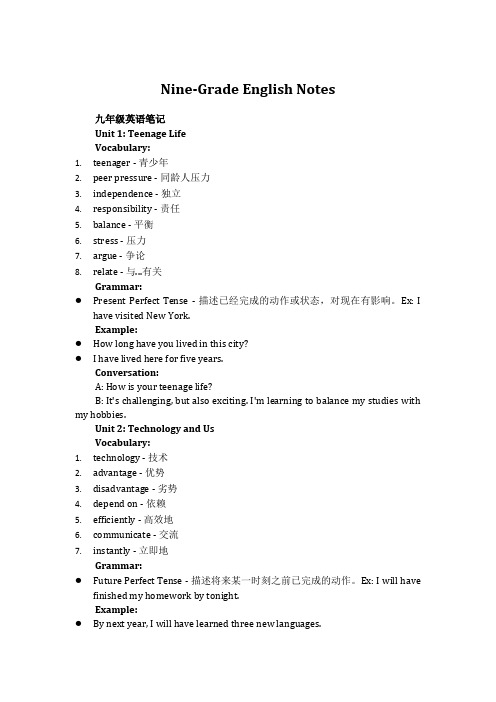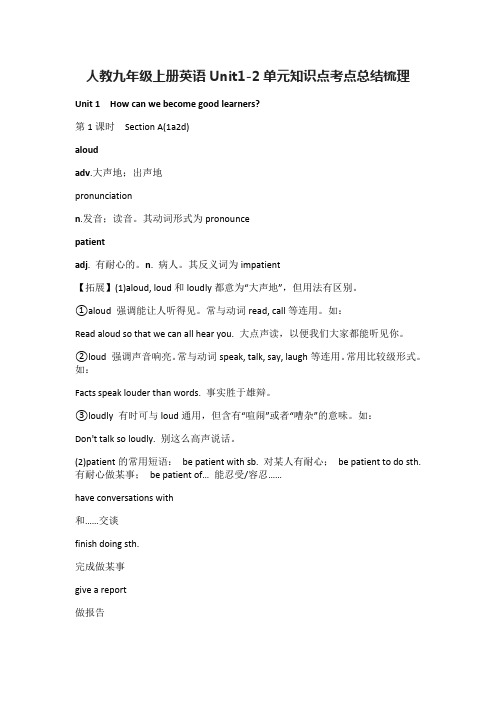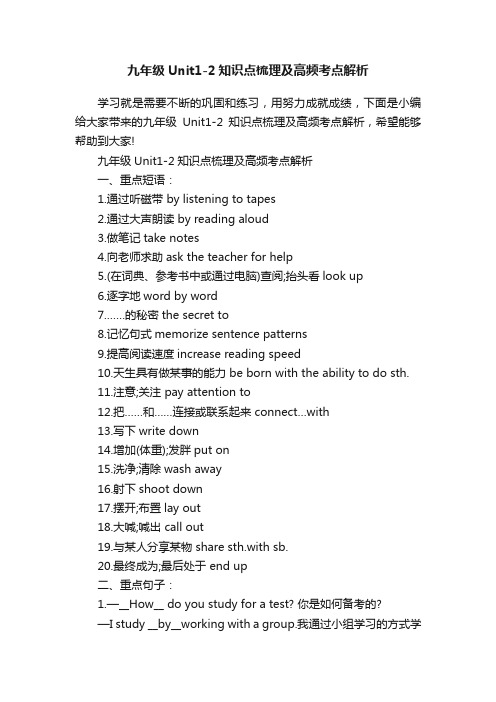九年级英语1-2单元笔记
九年级全一册英语笔记

九年级全一册英语笔记1. Unit 1: Personal Information- Vocabulary: name, age, nationality, occupation, hobbies, etc.- Grammar: to be verb, present simple tense, question words, possessive adjectives, etc.2. Unit 2: School Life- Vocabulary: subjects, teachers, classmates, school facilities, school rules, etc.- Grammar: past simple tense, adverbs of frequency, comparative and superlative forms, conditional sentences, etc.3. Unit 3: Everyday Activities- Vocabulary: daily routines, leisure activities, household chores, etc.- Grammar: present continuous tense, simple future tense, imperative sentences, etc.4. Unit 4: Food and Nutrition- Vocabulary: food and beverage items, cooking methods, nutritional information, etc.- Grammar: countable and uncountable nouns, quantifiers, modals of possibility, etc.5. Unit 5: Health and Fitness- Vocabulary: body parts, common illnesses, healthy habits, exercise routines, etc.- Grammar: present perfect tense, passive voice, modal verbs of advice and obligation, etc.6. Unit 6: Media and Communication- Vocabulary: media platforms, types of communication, social media, etc.- Grammar: reported speech, indirect questions, phrasal verbs, etc.7. Unit 7: Travel and Tourism- Vocabulary: transportation, tourist attractions, travel documents, accommodation, etc.- Grammar: past continuous tense, present perfect continuous tense, unreal conditionals, etc.8. Unit 8: Environment and Ecology- Vocabulary: natural disasters, climate change, pollution, endangered species, etc.- Grammar: passive voice, causative verbs, reported questions, etc.9. Unit 9: Culture and Society- Vocabulary: traditions, customs, festivals, cultural values, etc.- Grammar: relative clauses, gerunds and infinitives, connectives, etc.。
九年级英语笔记

Nine-Grade English Notes九年级英语笔记Unit 1: Teenage LifeVocabulary:1.teenager - 青少年2.peer pressure - 同龄人压力3.independence - 独立4.responsibility - 责任5.balance - 平衡6.stress - 压力7.argue - 争论8.relate - 与...有关Grammar:●Present Perfect Tense - 描述已经完成的动作或状态,对现在有影响。
Ex: Ihave visited New York.Example:●How long have you lived in this city?●I have lived here for five years.Conversation:A: How is your teenage life?B: It's challenging, but also exciting. I'm learning to balance my studies with my hobbies.Unit 2: Technology and UsVocabulary:1.technology - 技术2.advantage - 优势3.disadvantage - 劣势4.depend on - 依赖5.efficiently - 高效地municate - 交流7.instantly - 立即地Grammar:●Future Perfect Tense - 描述将来某一时刻之前已完成的动作。
Ex: I will havefinished my homework by tonight.Example:●By next year, I will have learned three new languages.Conversation:A: How do you think technology has changed our lives?B: It has made communicating easier, but it also makes us dependent on devices.Unit 3: Environmental ProtectionVocabulary:1.environment - 环境2.pollution - 污染3.conserve - 保护4.recycle - 回收5.sustainable - 可持续的6.ecosystem - 生态系统Grammar:●Conditional Sentences (Type 2) - 描述与现在事实相反的情况。
九年级英语1-2单元笔记

九年级英语1-2单元笔记Unit11. by + doing通过……方式如:by studying with a groupby 还可以表示:“在…旁”、“靠近”、“在…期间”、“用、”“经过”、“乘车”等如:I live by the river. I have to go back by ten o’clock.The thief entered the room by the window. The student went to park by bus.2. talk about 谈论,议论,讨论如:The students often talk about movie after class. 学生们常常在课后讨论电影。
talk to sb. === talk with sb. 与某人说话3. 提建议的句子:①What/ how about +doing sth.?如:What/ How about going shopping?②Why don’t you + do sth.?如:Why don’t you go shopping?③Why not + do sth. ? 如:Why not go shopping?④Let’s + do sth. 如:Let’s go shopping⑤Shall we/ I + do sth.?如:Shall we/ I go shopping?4. a lot 许多常用于句末如:I eat a lot. 我吃了许多。
5. too…to 太…而不能常用的句型too+adj./adv. + to do sth.如:I’m too tired to say anything. 我太累了,什么都不想说。
6. aloud, loud与loudly的用法三个词都与"大声"或"响亮"有关。
①aloud是副词,重点在出声能让人听见,但声音不一定很大,常用在读书或说话上。
九年级unit1 2知识点

九年级unit1 2知识点九年级 Unit 1-2 知识点Unit 11. 询问和描述食物和饮料在本单元中,我们学习了如何询问和描述食物和饮料。
我们可以使用以下句型:- What's your favorite food/drink?- My favorite food/drink is...- I like/love/enjoy...- I don't like/don't love/don't enjoy...2. 描述外貌和个性特征本单元我们还学习了如何描述外貌和个性特征。
我们可以使用以下句型:- What does he/she look like?- He/She has...- He/She is kind/funny/creative/talented...3. 表达时间和频率在这个单元里,我们学习了如何表达时间和频率。
我们可以使用以下表达方式:- What time is it?- It's...- I often/sometimes/never...- How often do you...?- I...every day/week/month/year.4. 表达喜好和态度这个单元,我们还学习了如何表达喜好和态度。
我们可以使用以下句型:- What do you think of...?- I like/love/enjoy...- I don't like/don't love/don't enjoy...- I think it's great/interesting/boring...Unit 21. 讨论日常活动和习惯在这个单元,我们学习了如何讨论日常活动和习惯。
我们可以使用以下句型:- What do you often do on weekends?- I often...- What time do you usually...?- I usually...- Do you often...?- Yes, I do./No, I don't.2. 谈论学校规则和活动在这个单元里,我们还学习了如何谈论学校规则和活动。
(全)人教九年级上册英语Unit1-2单元知识点考点总结梳理

人教九年级上册英语Unit1-2单元知识点考点总结梳理Unit 1How can we become good learners?第1课时Section A(1a2d)aloudadv.大声地;出声地pronunciationn.发音;读音。
其动词形式为pronouncepatientadj. 有耐心的。
n. 病人。
其反义词为impatient【拓展】(1)aloud, loud和loudly都意为“大声地”,但用法有区别。
①aloud 强调能让人听得见。
常与动词read, call等连用。
如:Read aloud so that we can all hear you. 大点声读,以便我们大家都能听见你。
②loud 强调声音响亮。
常与动词speak, talk, say, laugh等连用。
常用比较级形式。
如:Facts speak louder than words. 事实胜于雄辩。
③loudly 有时可与loud通用,但含有“喧闹”或者“嘈杂”的意味。
如:Don't talk so loudly. 别这么高声说话。
(2)patient的常用短语:be patient with sb. 对某人有耐心;be patient to do sth. 有耐心做某事;be patient of… 能忍受/容忍……have conversations with和……交谈finish doing sth.完成做某事give a report做报告word by word逐字/词地☆It's too hard to understand spoken English.理解英语口语太难了。
“It is+adj.+to do sth.”结构,it在句中作形式主语,真正的主语是动词不定式的内容。
如:He speaks in a low voice. It's too hard to hear him clearly. 他说话声音很低,太难听清楚他说什么了。
九年级上册英语人教版笔记

九年级上册英语人教版笔记一、Unit 1 How can we become good learners?1. 重点单词。
- aloud:adv. 大声地;出声地。
例如:Read aloud so that we can all hear you.(大声朗读以便我们都能听到你。
)- pronunciation:n. 发音;读音。
Your pronunciation is very good.(你的发音很好。
)- patient:adj. 有耐心的;n. 病人。
Be patient with children.(对孩子们要有耐心。
)- expression:n. 表达(方式);表示。
Facial expressions can show our feelings.(面部表情能展示我们的感受。
)2. 重点短语。
- by doing sth.:通过做某事。
We can improve our English by reading English books.(我们可以通过读英语书提高英语。
)- make mistakes:犯错。
Everyone makes mistakes when they learn something new.(每个人在学习新东西的时候都会犯错。
)- look up:查阅;抬头看。
Look up the new word in the dictionary.(在词典里查阅这个新单词。
)3. 重点句型。
- How do you study for a test?(你如何为考试而学习?)- I study by working with a group.(我通过小组合作来学习。
)- The more you read, the faster you'll be.(你读得越多,你就会读得越快。
)二、Unit 2 I think that mooncakes are delicious!1. 重点单词。
仁爱英语九上unit1topic2课文及总结笔记

仁爱英语九上unit1topic2课文及总结笔记一、课文概述仁爱英语九上Unit1 Topic2的课文以一个日常生活中的场景为背景,讲述了一段关于友谊的故事。
故事中,主人公Tom和他的朋友Jim在一次偶然的机会下结识了来自不同国家的新朋友。
在这个过程中,他们相互了解、交流,分享了各自的文化,最终成为了更好的朋友。
二、重点词汇和短语1.生词解释- diverse:不同的,多样的- customs:习俗,风俗- exchange:交换- communication:交流2.实用短语- Make friends with:与……交朋友- Share ideas:分享想法- Learn about:了解- Respect each other:互相尊重三、语法解析1.一般现在时一般现在时用于描述经常发生或习惯性的动作。
在本课文中,一般现在时用来描述主人公们之间的友谊以及他们如何相互交流。
2.一般过去时一般过去时用于描述过去发生的动作。
在本课文中,一般过去时用来回忆主人公们是如何结识新朋友的。
3.句子结构本课文中的句子结构多样,有简单句和复合句。
通过学习这些句子,学生可以了解到不同句子的构成以及如何运用恰当的时态。
四、实用对话1.对话内容课文中的对话发生在Tom和Jim与他们的外国朋友之间。
他们在对话中分享了各自国家的文化习俗,以及如何尊重和理解不同的文化。
2.口语技巧在这段对话中,学生可以学习到如何用英语礼貌地提问、回答问题,以及如何表达自己对不同文化的兴趣和尊重。
五、课后练习解答1.问题解答课后练习中的问题主要围绕课文内容、词汇和语法展开。
例如:“请描述Tom和Jim是如何结识新朋友的。
”、“请解释以下句子的时态:‘They often communicate with each other.’”等。
2.解题思路解答这些问题时,需要对课文内容、词汇和语法有充分的了解。
对于描述性问题,要结合课文中的情节进行回答;对于语法性问题,要明确句子所使用的时态并根据题意进行解答。
九年级Unit1-2知识点梳理及高频考点解析

九年级Unit1-2知识点梳理及高频考点解析学习就是需要不断的巩固和练习,用努力成就成绩,下面是小编给大家带来的九年级Unit1-2知识点梳理及高频考点解析,希望能够帮助到大家!九年级Unit1-2知识点梳理及高频考点解析一、重点短语:1.通过听磁带 by listening to tapes2.通过大声朗读 by reading aloud3.做笔记take notes4.向老师求助ask the teacher for help5.(在词典、参考书中或通过电脑)查阅;抬头看look up6.逐字地word by word7.……的秘密the secret to8.记忆句式memorize sentence patterns9.提高阅读速度increase reading speed10.天生具有做某事的能力 be born with the ability to do sth.11.注意;关注 pay attention to12.把……和……连接或联系起来connect…with13.写下write down14.增加(体重);发胖put on15.洗净;清除wash away16.射下shoot down17.摆开;布置lay out18.大喊;喊出 call out19.与某人分享某物 share sth.with sb.20.最终成为;最后处于 end up二、重点句子:1.—__How__ do you study for a test? 你是如何备考的?—I study __by__working with a group.我通过小组学习的方式学习。
2.Don't read __word__by__word__.不要逐字去读。
3.__The__more__ you read,__the__faster__ you'll be.你读得越多,你读得就会越快。
4.But __whether__or__not__ you can do this well__depends__on__ your learning habits.但是你能否做好取决于你的学习习惯。
- 1、下载文档前请自行甄别文档内容的完整性,平台不提供额外的编辑、内容补充、找答案等附加服务。
- 2、"仅部分预览"的文档,不可在线预览部分如存在完整性等问题,可反馈申请退款(可完整预览的文档不适用该条件!)。
- 3、如文档侵犯您的权益,请联系客服反馈,我们会尽快为您处理(人工客服工作时间:9:00-18:30)。
九年级英语1-2单元笔记Unit11. by + doing 通过……方式如:by studying with a groupby 还可以表示:“在…旁”、“靠近”、“在…期间”、“用、”“经过”、“乘车”等如:I live by the river. I have to go back by ten o’clock.The thief entered the room by the window. The student went to park by bus.2. talk about 谈论,议论,讨论如:The students often talk about movie after class. 学生们常常在课后讨论电影。
talk to sb. === talk with sb. 与某人说话3. 提建议的句子:①What/ how about +doing sth.?如:What/ How about going shopping?②Why don’t you + do sth.? 如:Why don’t you go shopping?③Why not + do sth. ? 如:Why not go shopping?④Let’s + do sth. 如:Let’s go shopping⑤Shall we/ I + do sth.? 如:Shall we/ I go shopping?4. a lot 许多常用于句末如:I eat a lot. 我吃了许多。
5. too…to 太…而不能常用的句型too+adj./adv. + to do sth.如:I’m too tired to say anything. 我太累了,什么都不想说。
6. aloud, loud与loudly的用法三个词都与"大声"或"响亮"有关。
①aloud是副词,重点在出声能让人听见,但声音不一定很大,常用在读书或说话上。
通常放在动词之后。
aloud没有比较级形式。
如: He read the story aloud to his son.他朗读那篇故事给他儿子听。
②loud可作形容词或副词。
用作副词时,常与speak, talk,laugh等动词连用,多用于比较级,须放在动词之后。
如:She told us to speak a little louder. 她让我们说大声一点。
③loudly是副词,与loud同义,有时两者可替换使用,但往往含有令人讨厌或打扰别人的意思,可位于动词之前或之后。
如: He does not talk loudly or laugh loudly in public. 他不当众大声谈笑。
7. not …at all 一点也不根本不如:I like milk very much. I do n’t like coffee at all.我非常喜欢牛奶。
我一点也不喜欢咖啡。
not经常可以和助动词结合在一起,at all 则放在句尾8. be / get excited about sth.=== be / get excited about doing sth.=== be excited to do sth. 对…感兴奋如:I am / get excited about going to Beijing.===I am excited to go to Beijing. 我对去北京感到兴奋。
9. ①end up doing sth 终止做某事,结束做某事如:The party ended up singing. 晚会以唱歌而结束。
②end up with sth. 以…结束如:The party ended up with her singing. 晚会以她的歌唱而告终。
10. first of all 首先. to begin with 一开始later on 后来、随11. also 也、而且(用于肯定句)常在句子的中间either 也(用于否定句)常在句末too 也(用于肯定句) 常在句末12. make mistakes 犯错如:I often make mistakes. 我经常犯错。
make a mistake 犯一个错误如:I have made a mistake. 我已经犯了一个错误。
13. laugh at sb. 笑话;取笑(某人)如:Don’t laugh at me!不要取笑我!14. take notes 做笔记,做记录15. enjoy doing sth . 喜欢做…乐意做…She enjoys playing football.她喜欢踢足球。
enjoy oneself 过得愉快如:He enjoyed himself. 他过得愉快。
16. native speaker 说本族语的人17. make up 组成、构成18. one of +(the+ 形容词比较级)+名词复数形式…其中之一如:She is one of the most popular teachers. 她是最受欢迎的教师之一。
19. It’s +形容词+(for sb. ) to do sth. (对于某人来说)做某事…如:It’s difficult (for me ) to study English. 对于我来说学习英语太难了。
句中的it 是形式主语,真正的主语是to study English20. practice doing 练习做某事如:She often practice speaking English. 她经常练习说英语。
21. decide to do sth. 决定做某事如:LiLei has decided to go to BeiJing . 李雷已经决定去北京。
22. unless 假如不,除非引导条件状语从句如:Y ou will fail unless you work hard..假如你不努力你会失败。
I won’t write unless he writes first. 除非他先写要不我不写23. deal with 处理如:I dealt with a lot of problem.24. worry about sb./ sth. 担心某人/ 某事如:Mother worried about his son just now. 妈妈刚才担心他的儿子。
25. be angry with sb. 对某人生气如:I was angry with her. 我对她生气。
26. perhaps === maybe 也许27. go by (时间) 过去如:Two years went by. 两年过去了。
28. see sb. / sth. doing 看见某人正在做某事强调正在发生see sb. / sth. do 看见某人在做某事如:如:She saw him drawing a picture in the classroom.她看见他正在教室里画画。
29. each other 彼此30. regard… as …把…看作为…. 如:The boys regarded Anna as a fool. 这些男孩把安娜看成傻瓜。
31. too many许多修饰可数名词如:too many girlstoo much许多修饰不可数名词如:too much milk much too太修饰形容词如:much too beautiful32. change…into…将…变为…如:The magician changed the pen into a book. 这个魔术师将这本书变为一本书。
33. with the help of sb. == with one’s help 在某人的帮助下如:with the help of LiLei == with LiLei’s help在李雷的帮助下34. compare … to …把…与…相比如:Compare you to Anna, you are lucky.你和安娜相比,你是幸运的。
35. instead 代替用在句末,副词(字面上常不译出来)instead of sth. / doing sth. 代替,而不是用在句中,动词如:Last summer I went to Beijing. This year I’m going to Shanghai instead.去年夏天我去北京, 今年我将要去上海。
I will go instead of you. 我将代替你去。
He stayed at home instead of going swimming. 他呆在家里而不是去游泳。
九年级英语Unit21. used to do sth. 过去常常做某事否定形式:didn’t use to do sth. / used not to do sth. 如:He used to play football after school. 放学后他过去常常踢足球。
Did he use to play football? Yes, I did. No, I didn’t.He didn’t use to smoke. 他过去不吸烟。
2. 反意疑问句如:Lily is a student, isn’tLily will go to China, won’t she?②否定陈述句+肯定提问如:She doesn’t come from China, does she?You haven’t finished homework, have you?③提问部分用代词而不用名词Lily is a student, isn’t she?④陈述句中含有否定意义的词,如:little, few, never, nothing, hardly等。
其反意疑问句用肯定式。
如:He knows little English, does he?他一点也不懂英语,不是吗?They hardly understood it, did they?他们几乎不明白,不是吗?3. play the piano弹钢琴4. ①be interested in sth. 对…感兴趣②be interested in doing sth. 对做…感兴趣如:He is interested in math, but he isn’t interested in speakingEnglish. 他对数学感兴趣,但是他对说英语不感兴趣。
5. interested adj. 感兴趣的,指人对某事物感兴趣,往往主语是人interesting adj.有趣的,指某事物/某人具有趣味,主语往往是物6. still 仍然,还用在be动词的后面如:I’m still a student.用在行为动词的前面如:I still love him.7. the dark 天黑,晚上,黑暗8. 害怕…be terrified of sth. 如:I am terrified of the dog.be terrified of doing sth. 如:I am terrified of speaking.9. on 副词,表示(电灯、电视、机械等)在运转中/打开,其反义词off. with the light on 灯开着10. walk to somewhere 步行到某处walk to school 步行到学校11.spend 动词,表示“花费金钱、时间”①spend…on sth. 在某事上花费(金钱、时间)②spend…doing sth. 花费(金钱、时间)去做某事如:He spends too much time on clothes. 他花费太多的时间在衣着He spend 3 months building the bridge.他花费了三个月去建这座桥。
